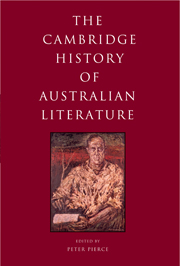Book contents
- Frontmatter
- Introduction
- FROM EUROPEAN IMAGININGS OF AUSTRALIA TO THE END OF THE COLONIAL PERIOD
- FROM THE LATE NINETEENTH CENTURY TO 1950
- TRAVERSES
- 13 Australian children’s literature
- 14 Representations of Asia
- 15 Autobiography
- 16 Riding on the ‘uncurl’d clouds’: The intersections of history and fiction
- FROM 1950 TO NEARLY NOW
- Select bibliography
- Index
- References
14 - Representations of Asia
from TRAVERSES
Published online by Cambridge University Press: 28 May 2011
- Frontmatter
- Introduction
- FROM EUROPEAN IMAGININGS OF AUSTRALIA TO THE END OF THE COLONIAL PERIOD
- FROM THE LATE NINETEENTH CENTURY TO 1950
- TRAVERSES
- 13 Australian children’s literature
- 14 Representations of Asia
- 15 Autobiography
- 16 Riding on the ‘uncurl’d clouds’: The intersections of history and fiction
- FROM 1950 TO NEARLY NOW
- Select bibliography
- Index
- References
Summary
The Eastern bogeyman
Visions of ‘the East’ have turned even the most unromantic Australian heads. Henry Lawson’s poem ‘The Tracks that Lie by India’, first published in the Bulletin in June 1905, finds the poet planning to return home overland, via the Indian subcontinent, after a projected trip to London. This is an itinerary familiar from the so-called hippie trail of the late 1960s and early 70s, but relatively unheard of in Lawson’s day. Not uncommonly for a Western male contemplating exotic Asia, his fancy turns to the women and the pleasures that await him there: ‘’tis sweet to court some foreign girl with eyes of lustrous glow,’ he writes, ‘Who does not know my language and whose tongue I do not know.’ The poem ends with a foreign fantasy that recalls Banjo Paterson’s famous daydream of escape to the Bush from the ‘dusty dirty’ city and ‘the round eternal of the cash-book and the journal’. By contrast, Lawson’s own ‘vision splendid’ is dreamily Asian:
The tracks that run by India to China and Japan,
The tracks where all the rivers go – the tracks that call a Man!
I’m wearied of the formal lands of parson and of priest,
Of dollars and of ‘fashions,’ and I’m drifting towards the East;
I’m tired of cant and cackle, and of sordid jobbery –
The misty ways of Asia are calling unto me.
- Type
- Chapter
- Information
- The Cambridge History of Australian Literature , pp. 303 - 322Publisher: Cambridge University PressPrint publication year: 2009
References
- 1
- Cited by

